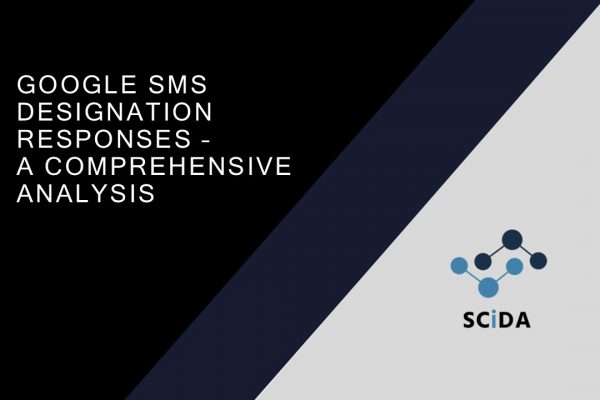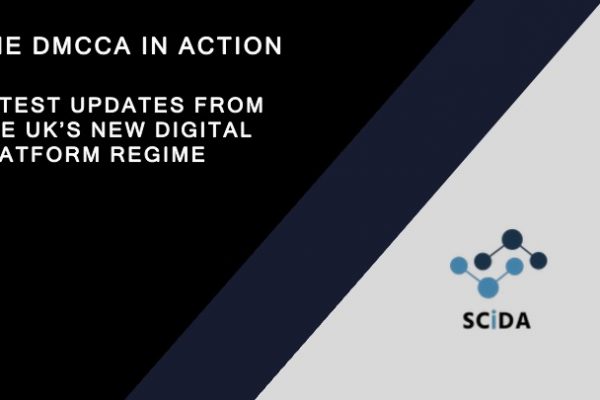The third annual UK Digital Markets Competition Regulation Forum by Thought Leaders 4 Competition, held on 23 September 2025, provided a comprehensive assessment of the UK’s first year under the Digital Markets, Competition and Consumers Act (DMCCA). With the CMA’s Digital Markets Unit having completed its initial SMS investigations into Google and Apple, the conference offered crucial insights into the early implementation challenges and successes of the UK’s new digital markets regime. For the SCiDA team, here are the key highlights from this pivotal gathering of regulators, practitioners, and industry representatives.
By Anush Ganesh

Early SMS Investigations: Progress and Challenges
The conference opened with the conference co-chair, Verity Egerton-Doyle from Linklaters providing opening remarks before launching into a detailed examination of the CMA’s first Strategic Market Status (SMS) investigations targeting Google Search and the Apple-Google mobile ecosystems. Shruti Hiremath from Clifford Chance noted that while the participative elements had been well-handled with strong third-party engagement, the CMA had strategically chosen easily achievable goals for these inaugural cases. Hiremath emphasised the value of the intervention roadmaps, which serve as useful previews for both current and future designated firms.
Yi Ling Ng from RBB Economics, who assisted the CMA during the investigations, highlighted the unique evidence-based approach required under the DMCCA. Ng praised the CMA’s decision to port data from previous market studies (DAMS), which eliminated duplication of work and allowed for more efficient assessment of market evolution. However, Ng cautioned that the CMA may have over-reached in some areas, particularly given how significantly digital markets have evolved since the original studies were conducted.
Lisa Wright from Slaughter and May offered a more critical perspective, supporting the exclusion of Gemini from Google’s designation but questioning the inclusion of ad syndication services. Wright expressed particular scepticism about Google’s mobile market designation, arguing that the mobile market remains competitive. Wright also raised concerns about the roadmap approach, noting that while Category 1 interventions (search screens, fair ranking, publisher control, and data portability) appeared clear and proportionate, Category 2 interventions might pose implementation challenges.
Procedural Growing Pains
The discussion of procedural challenges was opened up by cochair of the event, Tom Smith from Geradin Partners who revealed several areas where the new regime is still finding its footing. Elizabeth Coleman from Eversheds Sutherland described the CMA’s rigorous information gathering process but acknowledged the pressure of tight statutory deadlines. Coleman emphasised the need to balance procedural requirements with the regulatory objectives, requiring careful engagement with both government and industry stakeholders.
Sharon Malhi from Freshfields drew comparisons with the EU’s Digital Markets Act, noting that while the DMA takes a more prescriptive approach, the CMA’s evidence-based system allows for more targeted interventions. However, Malhi questioned whether the initial designations truly demonstrated this targeted approach, particularly the bundling of all mobile operating systems. Malhi stressed the importance of keeping evidence current in such dynamic markets, pointing out that major players like TikTok weren’t even mentioned in ad syndication research.
Matthew Jones from Macfarlanes took a more optimistic view, praising the inclusion of third parties and the roadmap approach. Jones noted that extensive consultation had been conducted and that front-loading remedies was the correct approach. Jones suggested that the nine-month deadline for future investigations could be manageable with a forward-looking approach, though he noted missed opportunities in sectors like open banking.
Regulatory Coordination and the Growth Agenda
The regulator panel chaired by Tom Smith revealed important insights into how different UK regulators are coordinating their digital market interventions. Simeon Thornton from Ofcom discussed the intersection between digital markets regulation and media plurality concerns, particularly regarding Google Search’s impact on publishers and democratic discourse. Thornton confirmed that cloud services regulation would likely fall under the DMCCA, with AWS and Microsoft potentially facing designation next year.
Thornton drew useful parallels with Ofcom’s net neutrality regime, suggesting that prescriptive rules can benefit users when properly implemented, though interpretation risks remain. Thornton cited traffic management and zero-rating as examples where Ofcom found no competition concerns, emphasising the importance of accurate tool deployment.
Alex Olive from the Payment Systems Regulator (PSR) highlighted the critical coordination required around digital wallets, where both competition and payments regulation intersect. The PSR’s focus on fraud policy and national security considerations demonstrates how digital markets regulation connects to broader policy objectives beyond pure competition concerns.
Consumer Protection Powers: A Complementary Tool

The panel on consumer enforcement powers chaired by Verity Egerton-Doyle revealed how the CMA’s new consumer protection capabilities could complement its competition tools in digital markets. Stephen McDonald from Which? argued that the CMA hadn’t used these powers aggressively enough and could have moved faster to ensure compliance. McDonald highlighted gaps in current consumer law, particularly around manipulative choice architecture and opt-in mechanisms that aren’t adequately covered by existing misleading advertising rules.
David Perry, Legal Director at the CMA, defended the authority’s approach, emphasising a “compliance first mindset” while acknowledging that they had seen changes in big tech behaviour. Perry confirmed that the CMA was actively considering online choice architecture issues, including misleading urgency cases and price reduction claims.
The discussion revealed that consumer law could be particularly valuable for addressing exploitative behaviour that might not meet competition law thresholds, and for reaching a much broader range of firms than SMS designation.
The State of the Regime: CMA’s Perspective
Euan MacMillan, Senior Director of the Digital Markets Unit, provided the keynote address outlining the CMA’s strategic approach using four key principles: Pace (nine-month deadlines), Proportionality (targeted measures for a handful of firms), Predictability (through roadmaps), and Process (extensive consultation and engagement).
MacMillan confirmed that Parliament hadn’t provided clear objectives for the regime beyond the government’s request to unlock growth in the UK digital economy. This has required the CMA to develop its own interpretation of proportionate and effective intervention.
On Google Search, MacMillan emphasised the platform’s “key position” and outlined the three-category roadmap: Category 1 interventions (search screens, fair ranking, publisher control, data portability) as the highest priority; Category 2 focusing on Google’s bargaining position and treatment of rivals; and Category 3 covering other issues.
For mobile ecosystems, MacMillan highlighted the £1.5 billion contribution of app development to UK GDP and the CMA’s engagement with 190 stakeholders. The focus would be on app distribution conduct requirements, with Google facing requirements around fair and transparent ranking, while Apple would need to address interoperability for app developers and enable UK fintech wallets.
Industry Perspectives: Compliance and Competition
The in-house panel provided crucial insights into how the regime is being experienced by both designated firms and their competitors. Oliver Bethell from Google praised the evidence-based approach while noting lessons from US litigation. Bethell emphasised the rapid pace of AI development and the need for constructive discourse, suggesting that the adversarial approach seen in some jurisdictions doesn’t help innovation.
Helen Kennedy-Shamir from Checkatrade highlighted the real-world impact on smaller businesses, noting that AI overviews were affecting their recommendation platform. Kennedy-Shamir stressed that smaller firms couldn’t wait for long-term regulatory timelines and lacked Google’s resources for extended legal processes.
Alex Rennie from Skyscanner emphasised their dependence on Google for business growth, noting that their success was directly linked to fair treatment in Google Search results. Rennie called for clarity on self-preferencing rules, particularly how Article 6(5) of the DMA principles might apply in practice.
Aurélien Mähl from DuckDuckGo praised the CMA’s analysis while emphasising the importance of data sharing remedies, drawing lessons from recent US court decisions. Mähl highlighted the significance of AI chatbot inclusion in remedies and suggested that non-intervention in digital markets had previously been a political rather than economic decision.
Matt Rogerson from Financial Times discussed the use of data, noting that clarity was needed on publisher autonomy for markets to function properly. Rogerson emphasised the need for clarity on licensing with all publishers and suggested that the CMA would need to fight political pressure to come to the aid of firms that want to use Google’s platform.

Merger Control Evolution
The tech merger panel revealed how digital markets regulation is influencing merger control practices. Jenine Hulsmann from Weil, Gotshal & Manges noted that cases like Meta-Giphy had sent shockwaves through the tech sector, with material influence thresholds being reconsidered. Hulsmann highlighted differences between UK and EU approaches, particularly regarding Microsoft remedies and efficiency considerations in other markets.
Elisa Mariscal from Cornerstone Research discussed new theories of harm based on economic principles, noting that some issues are not competition-related and require assessment of whether they are sector-related or competition-related.
Ricardo Zimbrón from Cleary Gottlieb noted the challenge facing the CMA: criticized in 2019 for not doing enough, they now face criticism for potentially damaging UK investment. Zimbrón observed that the shift from behavioral remedies, previously criticized by the CMA as too risky, reflects this changed approach.
David Lawrence from Frontier Economics discussed dynamic competition theories of harm, noting uncertainties around counterfactuals and highlighting academic research showing mixed evidence on the relationship between competition enforcement and investment.
Private Enforcement and Appeals
The final panels explored how the new regime would interact with private enforcement and judicial oversight. Lesley Hannah from Hausfeld explained that while quantitative designation thresholds couldn’t be challenged, qualitative criteria around market position could face appeal, though recent unsuccessful challenges (like TikTok’s EU appeal) suggested a high bar for success.
Kim Dietzel from Herbert Smith Freehills outlined the Competition Appeal Tribunal’s limited scope for reviewing CMA decisions, focusing on legality rather than merits. However, Dietzel noted grounds for challenge could include decisions beyond designated SMS areas, irrationality, disproportionality, or human rights breaches.
Daniel Carall-Green from Fountain Court discussed the potential for class actions, noting that many digital market harms were already covered by sector-specific legislation in areas like financial services, water, and energy.
Looking Forward: Enforcement Priorities
The conference concluded with discussions about the CMA’s broader enforcement priorities beyond SMS investigations. Davina Garrod from Akin noted that the ongoing Google Ad-tech case demonstrated continued use of traditional competition tools, while Jessica Radke from Linklaters highlighted how the CMA’s new powers freed up resources to pivot to other priorities, including previously closed App Store cases.
Conclusion: A Regime Finding Its Feet
The UK Digital Markets Competition Regulation Forum 2025 revealed a regulatory regime that, while still in its early stages, is beginning to establish clear patterns and priorities. The CMA’s evidence-based, targeted approach appears to be gaining traction, though implementation challenges remain significant.
Key themes emerging from the conference include the importance of regulatory coordination across different authorities, the complementary role of consumer protection powers, and the ongoing tension between speed and thoroughness in digital markets regulation. The industry perspective reveals both appreciation for the consultative approach and frustration with the pace of change, particularly among smaller businesses facing immediate competitive pressures.
Perhaps most significantly, the conference demonstrated the value of continued dialogue between regulators, industry, and civil society. As the regime matures, this collaborative approach will be crucial for ensuring that the UK’s digital markets regulation achieves its goal of unlocking growth while maintaining competitive markets.





